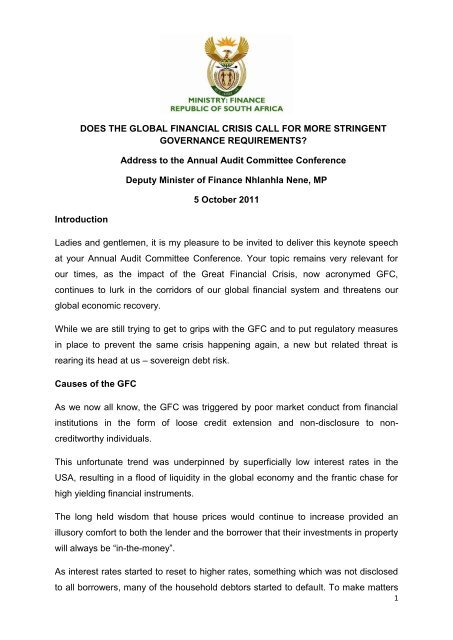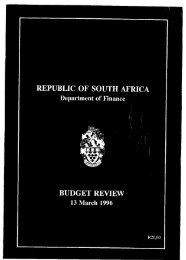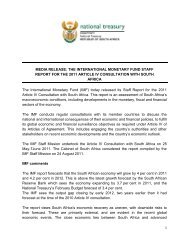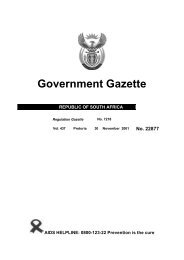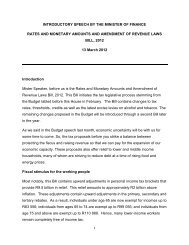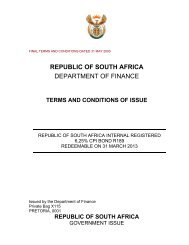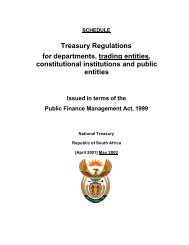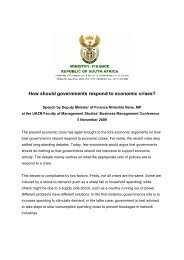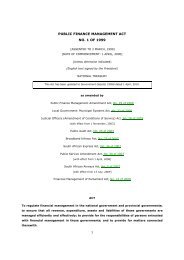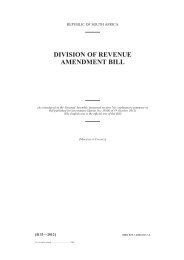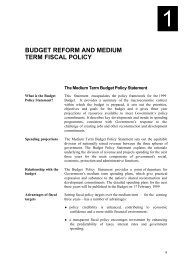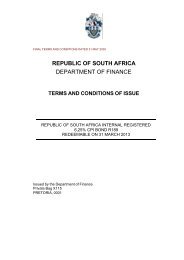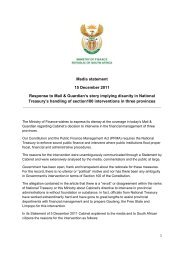Speech by Deputy Minister of Finance at the ... - National Treasury
Speech by Deputy Minister of Finance at the ... - National Treasury
Speech by Deputy Minister of Finance at the ... - National Treasury
Create successful ePaper yourself
Turn your PDF publications into a flip-book with our unique Google optimized e-Paper software.
DOES THE GLOBAL FINANCIAL CRISIS CALL FOR MORE STRINGENT<br />
GOVERNANCE REQUIREMENTS?<br />
Introduction<br />
Address to <strong>the</strong> Annual Audit Committee Conference<br />
<strong>Deputy</strong> <strong>Minister</strong> <strong>of</strong> <strong>Finance</strong> Nhlanhla Nene, MP<br />
5 October 2011<br />
Ladies and gentlemen, it is my pleasure to be invited to deliver this keynote speech<br />
<strong>at</strong> your Annual Audit Committee Conference. Your topic remains very relevant for<br />
our times, as <strong>the</strong> impact <strong>of</strong> <strong>the</strong> Gre<strong>at</strong> Financial Crisis, now acronymed GFC,<br />
continues to lurk in <strong>the</strong> corridors <strong>of</strong> our global financial system and thre<strong>at</strong>ens our<br />
global economic recovery.<br />
While we are still trying to get to grips with <strong>the</strong> GFC and to put regul<strong>at</strong>ory measures<br />
in place to prevent <strong>the</strong> same crisis happening again, a new but rel<strong>at</strong>ed thre<strong>at</strong> is<br />
rearing its head <strong>at</strong> us – sovereign debt risk.<br />
Causes <strong>of</strong> <strong>the</strong> GFC<br />
As we now all know, <strong>the</strong> GFC was triggered <strong>by</strong> poor market conduct from financial<br />
institutions in <strong>the</strong> form <strong>of</strong> loose credit extension and non-disclosure to noncreditworthy<br />
individuals.<br />
This unfortun<strong>at</strong>e trend was underpinned <strong>by</strong> superficially low interest r<strong>at</strong>es in <strong>the</strong><br />
USA, resulting in a flood <strong>of</strong> liquidity in <strong>the</strong> global economy and <strong>the</strong> frantic chase for<br />
high yielding financial instruments.<br />
The long held wisdom th<strong>at</strong> house prices would continue to increase provided an<br />
illusory comfort to both <strong>the</strong> lender and <strong>the</strong> borrower th<strong>at</strong> <strong>the</strong>ir investments in property<br />
will always be “in-<strong>the</strong>-money”.<br />
As interest r<strong>at</strong>es started to reset to higher r<strong>at</strong>es, something which was not disclosed<br />
to all borrowers, many <strong>of</strong> <strong>the</strong> household debtors started to default. To make m<strong>at</strong>ters<br />
1
worse, a lot <strong>of</strong> <strong>the</strong>se mortgages were packaged, moved from balance sheets and<br />
sold to o<strong>the</strong>r investors, <strong>the</strong>re<strong>by</strong> transferring <strong>the</strong> risk out <strong>of</strong> <strong>the</strong> retail banking system<br />
to o<strong>the</strong>r financial systems. These packaged assets came to be known as <strong>the</strong><br />
Subprime Mortgage Backed Securities.<br />
As individuals started to default on <strong>the</strong>ir loans, <strong>the</strong> performance <strong>of</strong> Subprime<br />
Mortgage Backed Securities started to be neg<strong>at</strong>ively affected, <strong>the</strong>re<strong>by</strong> adversely<br />
affecting <strong>the</strong> various institutional investors, and also <strong>the</strong> investment and retail banks.<br />
Because banks could no longer trust each o<strong>the</strong>r, as <strong>the</strong>y did not know which bank<br />
was sitting on good or bad assets, <strong>the</strong>y started shying away from lending to each<br />
o<strong>the</strong>r. To fur<strong>the</strong>r preserve <strong>the</strong>ir already strained balance sheets, banks started<br />
deleveraging and avoiding fur<strong>the</strong>r lending to corpor<strong>at</strong>es and individuals. So we<br />
entered <strong>the</strong> gre<strong>at</strong> global economic recession.<br />
Then we had institutions which veered away from <strong>the</strong>ir traditional business and<br />
started to do quasi-banking business. AIG is a classic example <strong>of</strong> an insurance<br />
company which got caught in <strong>the</strong> GFC web because <strong>of</strong> excessively providing Credit<br />
Default Swaps – th<strong>at</strong> is insurance against credit defaults. Needless to mention, when<br />
<strong>the</strong> defaults started, even one <strong>of</strong> <strong>the</strong> largest global insurance companies could not<br />
deal with <strong>the</strong> crisis.<br />
At <strong>the</strong> root <strong>of</strong> all <strong>the</strong>se is short-termism and greed. The excessive desire to make<br />
excessive money encouraged <strong>the</strong> cre<strong>at</strong>ion <strong>of</strong> complex financial instruments with <strong>the</strong><br />
sole purpose <strong>of</strong> making more money. As <strong>the</strong> rush for such complex instruments<br />
surged, people traded and o<strong>the</strong>rs invested in instruments <strong>the</strong>y did not even<br />
understand, let alone <strong>the</strong> regul<strong>at</strong>or.<br />
Credit R<strong>at</strong>ing Agencies (CRAs) did not help <strong>the</strong> situ<strong>at</strong>ion <strong>by</strong> assigning high r<strong>at</strong>ings to<br />
complex structured subprime debt based on inadequ<strong>at</strong>e historical d<strong>at</strong>a and in some<br />
cases flawed models. Financial institutions too relied heavily and blindly on <strong>the</strong><br />
CRAs and put less reliance on <strong>the</strong>ir own internal risk management mechanisms.<br />
Governance lapses: global and corpor<strong>at</strong>e<br />
The big question, which I suppose is very relevant for all <strong>of</strong> us here today, is: to wh<strong>at</strong><br />
extent did <strong>the</strong> failures or weaknesses in corpor<strong>at</strong>e governance contribute to <strong>the</strong><br />
GFC? Could good corpor<strong>at</strong>e governance, proper risk management and effective<br />
2
oard oversight have prevented all <strong>the</strong>se? The answer, to a certain extent, should be<br />
a yes.<br />
The weaknesses in <strong>the</strong> global financial architecture surely did not do much to help.<br />
Failures in co-ordin<strong>at</strong>ion between different country regul<strong>at</strong>ors responsible for<br />
supervising multin<strong>at</strong>ional financial institutions weakened <strong>the</strong>ir ability to respond<br />
swiftly and adequ<strong>at</strong>ely to prevent and amelior<strong>at</strong>e <strong>the</strong> spread <strong>of</strong> risk and <strong>the</strong> crisis.<br />
Major financial and even non-financial companies had in place reward systems th<strong>at</strong><br />
encouraged and rewarded high levels <strong>of</strong> risk-taking, focusing on short term benefits,<br />
without taking into account <strong>the</strong> long term performance and <strong>the</strong> interests <strong>of</strong> <strong>the</strong>ir<br />
companies. Institutional investors need to take some responsibility here as <strong>the</strong>y are<br />
everyday drivers <strong>of</strong> share prices, and most <strong>of</strong> <strong>the</strong>m tend to suffer from short term<br />
“herding” behaviour.<br />
A lot <strong>of</strong> <strong>the</strong> people who played a role in <strong>the</strong> GFC didn‟t care much if things went<br />
under because <strong>the</strong>y would have made <strong>the</strong>ir quick bucks and moved on to something<br />
else. And we should dare say th<strong>at</strong> probably <strong>the</strong> banks <strong>the</strong>mselves, consciously or<br />
subconsciously, believed th<strong>at</strong> <strong>the</strong>y were too big to be ignored, let alone fail.<br />
Wh<strong>at</strong> has been evident, post <strong>the</strong> crisis, is th<strong>at</strong> <strong>the</strong>re have been significant failures <strong>of</strong><br />
internal risk management systems in some major multin<strong>at</strong>ional financial institutions,<br />
made even worse <strong>by</strong> incentive systems th<strong>at</strong> encouraged and rewarded high levels <strong>of</strong><br />
risk taking. The former CEO <strong>of</strong> Citibank has been widely quoted as having said:<br />
“While <strong>the</strong> music is playing, you have to dance”. This highlighted <strong>the</strong> „short-termism‟<br />
mind-set prevailing <strong>at</strong> <strong>the</strong> time, which promoted short term gains and performances<br />
<strong>at</strong> <strong>the</strong> expense <strong>of</strong> long term growth, including also society gains, as many people lost<br />
<strong>the</strong>ir jobs in <strong>the</strong> wake <strong>of</strong> <strong>the</strong> GFC.<br />
We must all ask ourselves, to wh<strong>at</strong> extent were company boards clear about <strong>the</strong><br />
str<strong>at</strong>egies and risk appetite <strong>of</strong> <strong>the</strong>ir companies. Were <strong>the</strong> independent board<br />
members exercising proper oversight on <strong>the</strong>ir executive? Were <strong>the</strong>y asking “stupid”<br />
or “obvious” questions – because it is such “stupid” and “obvious” questions which<br />
can reveal issues taken for granted <strong>by</strong> <strong>the</strong> executive.<br />
As we all are g<strong>at</strong>hered here today, I am certain th<strong>at</strong> we want to equip ourselves<br />
adequ<strong>at</strong>ely in order to discharge our duties in our respective institutions where we<br />
oper<strong>at</strong>e. And we must not stop with our institutions, we must think <strong>of</strong> <strong>the</strong> impact, both<br />
3
positive and neg<strong>at</strong>ive, our institutions have on our societies. You, as audit<br />
committees and auditors, must all recognise <strong>the</strong> important role you play in helping<br />
companies and o<strong>the</strong>r entities to identify weaknesses and put in place measures to<br />
streng<strong>the</strong>n <strong>the</strong>ir governance mechanisms. You must be <strong>the</strong> whistle-blowers for<br />
society.<br />
I would even include <strong>the</strong> <strong>of</strong>ten overlooked Remuner<strong>at</strong>ion Committees in this<br />
governance role, which have to come up with remuner<strong>at</strong>ion and reward policies<br />
commensur<strong>at</strong>e to “fit and proper” managers, and reasonable risk taking.<br />
The role <strong>of</strong> boards<br />
As a country, we did rel<strong>at</strong>ively well amid <strong>the</strong> GFC. However, we should never be<br />
complacent. We now have <strong>the</strong> benefit <strong>of</strong> <strong>the</strong> recent financial crisis from which we can<br />
draw lessons on <strong>the</strong> failures <strong>of</strong> governance and how best to avoid <strong>the</strong> destructive<br />
p<strong>at</strong>h th<strong>at</strong> led <strong>the</strong> entire world to this current situ<strong>at</strong>ion. How did it all come to this? To<br />
wh<strong>at</strong> extent did boards understand <strong>the</strong>ir mand<strong>at</strong>es and scope? Did <strong>the</strong>y exercise <strong>the</strong><br />
oversight powers as <strong>the</strong>y were required and expected to?<br />
The question is a challenging one. Do we need more stringent governance rules, or<br />
actually, have <strong>the</strong> rules always been <strong>the</strong>re and we just took <strong>the</strong>m for granted?<br />
Various standard setting bodies and regul<strong>at</strong>ors intern<strong>at</strong>ionally, such as <strong>the</strong> Basel<br />
Committee on Banking Supervision, Intern<strong>at</strong>ional Organis<strong>at</strong>ion <strong>of</strong> Securities<br />
Commission (IOSCO), Organis<strong>at</strong>ion for Economic Cooper<strong>at</strong>ion and Development<br />
(OECD) have in place codes and principles on governance <strong>of</strong> financial institutions,<br />
for both banking and non-banking institutions. For instance, <strong>the</strong> Basel II capital<br />
accord contains mechanisms in Pillar II enabling regul<strong>at</strong>ors to impose additional<br />
capital charges for incentive structures th<strong>at</strong> encourage risky behaviour. Interestingly,<br />
and to <strong>the</strong> credit <strong>of</strong> our banks and regul<strong>at</strong>or, our banks have always held a higher<br />
than required Capital Adequacy R<strong>at</strong>io.<br />
A report published <strong>by</strong> <strong>the</strong> OECD in 2009 revealed a number <strong>of</strong> worrying trends on<br />
<strong>the</strong> failures <strong>of</strong> governance <strong>at</strong> board and management level <strong>of</strong> most multin<strong>at</strong>ional<br />
financial institutions. In particular, <strong>the</strong> OECD noted th<strong>at</strong> some boards had not put in<br />
place mechanisms to monitor <strong>the</strong> implement<strong>at</strong>ion <strong>of</strong> str<strong>at</strong>egic decisions such as<br />
balance sheet growth.<br />
4
The financial turmoil has revealed severe shortcomings in practices both in internal<br />
risk management and in <strong>the</strong> role <strong>of</strong> <strong>the</strong> boards in overseeing risk management<br />
systems <strong>at</strong> a number <strong>of</strong> banks and financial institutions. So again, <strong>the</strong> best practice<br />
in terms <strong>of</strong> rules and codes seem to be <strong>the</strong>re, but ei<strong>the</strong>r we do not understand <strong>the</strong>m<br />
well or we simply take <strong>the</strong>m for granted.<br />
A number <strong>of</strong> existing codes also stress th<strong>at</strong> executive directors should have a<br />
meaningful shareholding in <strong>the</strong>ir companies in order to align incentives with those <strong>of</strong><br />
<strong>the</strong> shareholders. The Senior Supervisors Group noted th<strong>at</strong> “an issue for a number<br />
<strong>of</strong> firms is whe<strong>the</strong>r compens<strong>at</strong>ion and o<strong>the</strong>r incentives have been sufficiently well<br />
designed to achieve an appropri<strong>at</strong>e balance between risk appetite and risk controls,<br />
between short run and longer run performance, and between individual or local<br />
business unit goals and firm-wide objectives”. This concern was also shared <strong>by</strong> <strong>the</strong><br />
Financial Stability Forum (2008). Ano<strong>the</strong>r report published <strong>by</strong> <strong>the</strong> Securities<br />
Exchange Commission about Bear Sterns also noted proximity <strong>of</strong> risk managers to<br />
traders, suggesting lack <strong>of</strong> independence.<br />
The Role <strong>of</strong> Auditors<br />
Where do you come in as audit committees or auditors? To answer <strong>the</strong>se questions,<br />
we must all understand wh<strong>at</strong> governance means. I like <strong>the</strong> definition <strong>by</strong> Deloitte<br />
Touche Tohm<strong>at</strong>su: governance is <strong>the</strong> term used to describe <strong>the</strong> role <strong>of</strong> persons<br />
entrusted with <strong>the</strong> supervision, control and direction <strong>of</strong> an entity.<br />
This role can be exercised <strong>by</strong> three entities, or a combin<strong>at</strong>ion <strong>the</strong>re<strong>of</strong>: <strong>the</strong> Board <strong>of</strong><br />
Directors, <strong>the</strong> Audit Committee, and o<strong>the</strong>r supervisory committees.<br />
For <strong>the</strong> Board <strong>of</strong> Directors to make decisions, and proper decisions, <strong>the</strong>y require<br />
relevant and reliable inform<strong>at</strong>ion. The auditor‟s primary role is to verify <strong>the</strong> accuracy<br />
<strong>of</strong> this inform<strong>at</strong>ion, among o<strong>the</strong>r things. Ultim<strong>at</strong>ely, <strong>the</strong>y contribute to ensuring th<strong>at</strong><br />
financial inform<strong>at</strong>ion given to investors is reliable. This is important since it enables<br />
discipline <strong>by</strong> <strong>the</strong> market.<br />
Audit Committees can also play a more holistic role than ensuring th<strong>at</strong> <strong>the</strong> financial<br />
st<strong>at</strong>ements are accur<strong>at</strong>e and reliable. For example, would you not assist us gre<strong>at</strong>ly<br />
as a society if you also checked th<strong>at</strong> <strong>the</strong> company had an Environment, Social and<br />
Governance (ESG) policy framework, th<strong>at</strong> this ESG framework was sound, and most<br />
5
importantly, th<strong>at</strong> <strong>the</strong> company, through its board, was complying with this policy?<br />
Should we not focus on group audits r<strong>at</strong>her than individual audits?<br />
Policy responses <strong>at</strong> intern<strong>at</strong>ional level<br />
The G20 has come up with a number <strong>of</strong> key policy principles to provide fur<strong>the</strong>r<br />
guidance to n<strong>at</strong>ional regul<strong>at</strong>ory frameworks, and streng<strong>the</strong>n institutions and crossborder<br />
regul<strong>at</strong>ory arrangements through cre<strong>at</strong>ing more formal mechanisms to coordin<strong>at</strong>e<br />
<strong>the</strong> work <strong>of</strong> regul<strong>at</strong>ors across borders. Through <strong>the</strong> Financial Stability Board<br />
(FSB) and o<strong>the</strong>r standard setting bodies, a lot <strong>of</strong> wh<strong>at</strong> emerged from <strong>the</strong> G20 has<br />
already found resonance with various countries, and South Africa has not been an<br />
exception.<br />
At intern<strong>at</strong>ional level, <strong>the</strong> crisis has also revealed <strong>the</strong> weaknesses <strong>of</strong> narrow focus <strong>of</strong><br />
financial regul<strong>at</strong>ion <strong>by</strong> only dealing with supervision <strong>of</strong> individual entities <strong>at</strong> a microprudential<br />
level.<br />
The new approach, which was mooted <strong>by</strong> <strong>the</strong> G20, is to move towards a macroprudential<br />
approach to financial regul<strong>at</strong>ion, which focuses on identifying global and<br />
domestic macroeconomic and financial stability risks toge<strong>the</strong>r. Put differently, it<br />
focuses on systems and financial institutions‟ links, domestically and abroad.<br />
South Africa’s response<br />
The global financial crisis has presented South Africa, like o<strong>the</strong>r countries, with <strong>the</strong><br />
opportunity to see how best to enhance its financial architecture and regul<strong>at</strong>ory<br />
framework.<br />
During his annual Budget <strong>Speech</strong> in Parliament in February 2011, <strong>the</strong> <strong>Minister</strong> <strong>of</strong><br />
<strong>Finance</strong> announced <strong>the</strong> release <strong>of</strong> a document titled: “A Safer Financial Sector to<br />
Serve South Africa Better”, which outlines a number <strong>of</strong> policy priorities which<br />
N<strong>at</strong>ional <strong>Treasury</strong> will be focusing on in <strong>the</strong> next few years.<br />
One <strong>of</strong> <strong>the</strong> most important announcements covered in <strong>the</strong> document is <strong>the</strong> shift to a<br />
“twin peaks” model. The twin peaks model is an objective-driven approach to<br />
regul<strong>at</strong>ion and seeks to establish two dedic<strong>at</strong>ed regul<strong>at</strong>ory bodies, one responsible<br />
for prudential regul<strong>at</strong>ion and <strong>the</strong> o<strong>the</strong>r for market conduct. As I indic<strong>at</strong>ed earlier in my<br />
speech, <strong>the</strong> failure in market conduct, and its supervision, played an important role in<br />
<strong>the</strong> GFC.<br />
6
No system <strong>of</strong> regul<strong>at</strong>ion can be successful unless it is transparent, independent and<br />
accountable, not only as far as Government is concerned but also <strong>the</strong> regul<strong>at</strong>ed<br />
industries and <strong>the</strong> public <strong>at</strong> large. Appointment <strong>of</strong> competent and highly skilled senior<br />
executives, board members and applying „fit and proper‟ tests to ensure highest<br />
levels <strong>of</strong> integrity, are important for all entities, both public and priv<strong>at</strong>e.<br />
We are fortun<strong>at</strong>e in South Africa to have dedic<strong>at</strong>ed pr<strong>of</strong>essionals like Mr Mervin<br />
King, who has since provided us with a blueprint for governance.<br />
Conclusion<br />
I would like to conclude with a cynical note and in agreement with <strong>the</strong> st<strong>at</strong>ement from<br />
Deloitte Touche Tehm<strong>at</strong>su: “No governance system, no m<strong>at</strong>ter how well designed,<br />
will fully prevent greedy, dishonest people from putting <strong>the</strong>ir personal interest ahead<br />
<strong>of</strong> <strong>the</strong> interests <strong>of</strong> <strong>the</strong> companies <strong>the</strong>y manage”.<br />
So, my answer to <strong>the</strong> question you posed is as follows: <strong>the</strong>re are already codes and<br />
principles <strong>of</strong> good corpor<strong>at</strong>e governance which are tried and tested. These<br />
intern<strong>at</strong>ional and local best practices should be incorpor<strong>at</strong>ed in internal risk<br />
management. Where we fail, as Boards <strong>of</strong> Directors, is when we ignore <strong>the</strong>se<br />
principles or take <strong>the</strong>m for granted. We also fail when we, as independent directors,<br />
are scared to ask <strong>the</strong> “obvious” and “stupid” questions. We should ask <strong>the</strong> executive;<br />
are you running <strong>the</strong> company properly and tre<strong>at</strong>ing your customers fairly?<br />
However, <strong>the</strong>re are areas which certainly require enhancement; for example <strong>the</strong><br />
focus on group supervision, co-ordin<strong>at</strong>ion and auditing <strong>of</strong> multin<strong>at</strong>ional financial<br />
entities. We also need to strike a good balance between rewarding hard work and<br />
excessive risk taking. As a member <strong>of</strong> <strong>the</strong> G20, we will continue to particip<strong>at</strong>e in <strong>the</strong><br />
global forums and adopt best practices where applicable.<br />
Good corpor<strong>at</strong>e governance alone will not solve all problems. The most important<br />
ingredient is <strong>the</strong> change <strong>of</strong> <strong>at</strong>titude and behaviour, and adherence to high levels <strong>of</strong><br />
integrity and moral fortitude. To <strong>the</strong> extent th<strong>at</strong> this is not <strong>the</strong> case, <strong>the</strong>re will always<br />
be a need to regul<strong>at</strong>e behaviour <strong>by</strong> putting rules and codes in place. It is incumbent<br />
on all <strong>of</strong> us to strive for good corpor<strong>at</strong>e citizenship.<br />
Thank you.<br />
7


